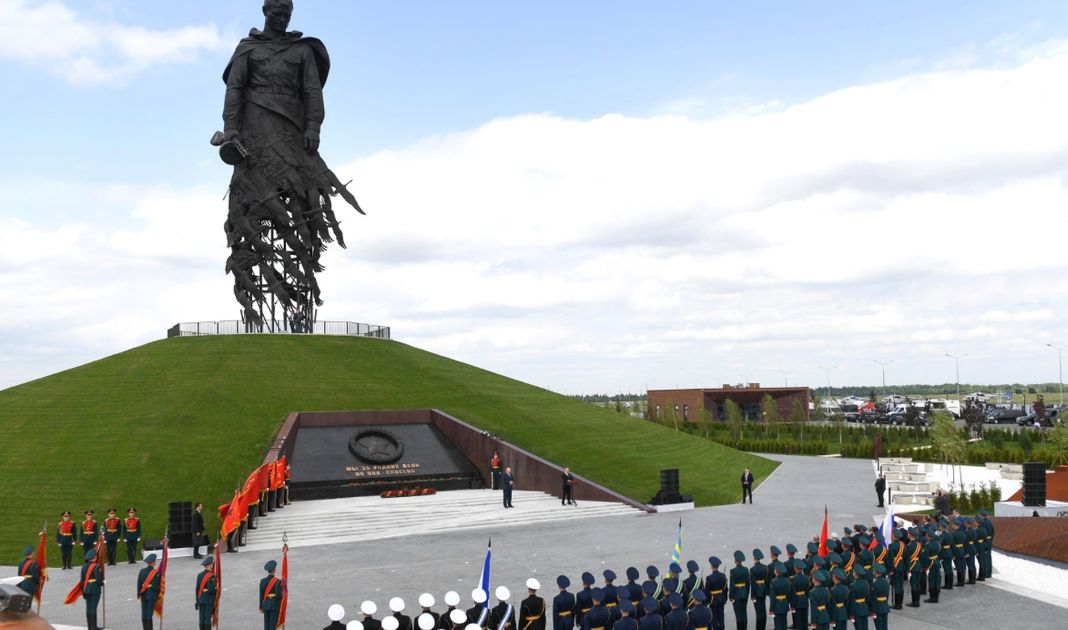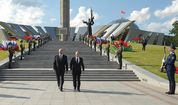Intermarium Weekly 23-30.06.2020

Opening of the Rzhev Memorial to the Soviet Soldier (kremlin.ru)
Belarus
The situation in the country is not as desperate as it appeared last week because both sides are now at the stage of preparations for the final struggle. From one side, the opposition forces – both pro-Russian and pro-European – are accumulating forces and trying to understand each other’s roles in the upcoming unrest and clashes with the regime. The regime is carefully learning the potential of the opposition and will try to divide it into different factions. Furthermore, the regime is mobilizing the electorate and people who can rise against the opposition. The regime is in especially active negotiations with foreign partners on both sides. Since the beginning of May, 650 people have been detained in Belarus, including many representatives of independent media. Journalists and bloggers are being arrested so that they cannot cover the protests before the presidential election. Police have confiscated their equipment and are trying to deprive citizens of access to independent information. In terms of non-political news, for example, there have been huge problems with tap water in Minsk and this has even demanded Lukashenka’s involvement.
Lukashenka and his vision on the situation in the country
Lukashenka stated June 26 that the main task of the country is not to allow a Belarusian “maydan” and to maintain national sovereignty. The grand assessment of the situation in the country, according to the President, is that “the limit of revolutions has been exhausted; moreover, we have no revolutionaries. But we have enough “maydanutykh”. But we don’t need a Maidan: we see what this leads to — the destruction of the country. Someone from the outside needs it: to tilt, to loosen, to swing, and then to make them do what they want.” For Lukashenka, the last resort left is to scare the middle class by the prospect of upcoming turmoil if they decide to turn their support from him to another candidate or the protesting masses.
On June 28, the TV channel Belarus 1 showed a closing speech by Alexander Lukashenka in front of an asset of the Minsk region in Salihorsk. He expressed his thoughts on the situation with Russian interference by their support for one of the opposition candidates, Babariko, and he said that it would be a nightmare for Russia if they were to lose their last ally in the region. Lukashenka has praised the fact that the Americans have started paying attention to his country but he criticized the role of the EU. Moreover, he confessed that he had given the order to arrest the main candidates and explained that these decisions had been made due to patriotic considerations for the country’s future. The President of Belarus warned that the republic could lose part of its territory and return to its 1921 borders when Belarus was a tiny country between the Soviet Union and Poland. His current grand strategy was perfectly expressed in the following statement: “I proceeded primarily from this, understanding that I’m sandwiched with you between a rock and a hard place: on the one hand, Russia, on the other – the European Union, and the boiler, which is constantly heating us from the south, is a warring Ukraine.” The global balance of power has changed, he says. Now we have China equal to the U.S. and he admits that the global status of American has been altered too. The Americans are surrounding China from all corners and, regarding the U.S., he added that the global hegemon cannot tackle challenges from within (social protests and pandemic). He again voiced doubts that COVID-19 is a natural disease.
Opposition leaders
All the main candidates are still detained in prisons, although it is business as usual for their campaign teams. Babariko’s team for example is made up of several hundred people, constantly working as part of a system built on the principles of decentralized operation which makes it easier to conduct an electoral campaign against the regime. His team is ready for a scenario in which the authorities block his registration as an official candidate in the upcoming elections. Searches in the bank where Babariko used to work are still ongoing. Representatives of the opposition described them as politically motivated. Babariko’s initiative to change the country’s constitution has put Lukashenka in a difficult position because this initiative has met with popular approval. In response, he announced that he would change the constitution after the elections.
The authorities have already started bureaucratic countermeasures against the opposition candidates. Signatures for potential presidential candidates, Viktor Babariko and Valery Tsepkalo, did not pass control of the district election commissions.
Grassroots opposition activists and demonstrators
According to the Minister of Internal Affairs, the opposition is organizing demonstrations via Telegram and different social networks and these rallies are professionally organized. The role of Radio Liberty was especially regarded as quite professional and effective. The minister stressed that the organizers “are already acting quite consciously not for the purpose of picketing, but they understand perfectly that they have invented and demonstrated a new form of mass event. Only this is not the old crowd, but a long chain. But the essence of this has not changed.” He indicated that the strategy and tactics of the demonstrators are quite unique and smart insofar as they have excelled as creating an emotional narrative. If a supporter of the opposition is a doctor, they use it well and after the fact of arrest put it in the way that the police has detained a doctor. Thus they pay attention to the fact that the demonstrator is a doctor, not a politically motivated activist. He also stated that events throughout the entire country have involved the participation of opposition supporters from Russia engaged in activities against the Russian government. Additionally, it was emphasized that all policemen have been instructed to avoid violence against the demonstrators due to the possibility of such incidents being used against the regime. In some Belarusian opposition media, it is possible to see articles indicating directly that in Belarus there is an authoritarian regime and the only way to bring about change is through the use of violence and the mobilization of huge proportions of the nation.
The prosecution, torture, abductions, and injuries of human rights activists and merely ordinary people who do not accept the regime’s rule are tremendously increasing. This week one more candidate has submitted documents for the elections. He is Valerii Cypkalo, he pointed out that the situation with democracy is very difficult in the country and he expressed concerns that if he and other oppositional candidates are not going to be approved by the Commission in the country, it essentially means that a political authoritarian regime has been established similar to those in the Arab world or in North Korea.
The main purpose of the arrests of many activists and bloggers, according to opposition media, is to destroy the system of “opinion leaders” in the country and thereby undermine the mobility and effectiveness of the protesters. In the same vein, Belarusian authorities have – since July 1 – banned foreign DNS-servers in the country in state institutions. This will make it much easier to control data traffic in the country and prevent the massive spread of information amongst Belarusians. However, as the experience of many countries shows, social media is incredibly effective in the organization of various types of protests.
Lukashenka and Russia
During the Victory Parade in Moscow, Lukashenka said that he had arrived at the “Homeland’s capital.” Concurrently he claimed that a “fake news war” had been declared against him from both sides of the borders. The most outrageous example of “fake news” had come from a Russian newspaper that had written that a member of his family was in possession of huge sums of money in a European bank. He mentioned Russia and Poland directly, but to some extent avoided placing any blame on Putin himself and signaled his hopes to settle any issues through direct contacts with the Russian President. The Kremlin has denied any such allegations and stated that they were especially reluctant to interfere in the internal affairs of a strategic partner. During the official events in Moscow, Lukashenka and Putin didn’t manage to speak but an event in Rzhev is scheduled for June 30 with the participation of both leaders. It seems that Lukashenka hopes to convince Putin of the need for a more amicable approach.
The Parliament of the Belarusian People’s Republic (Rada BNR, a self-styled government-in-exile) issued a statement in which it drew attention to the danger of contacts between the leaders of Belarus and Russia. The alternative institution also criticized closed non-public contacts between the regimes of Alexander Lukashenko and Vladimir Putin and, in particular, their meeting scheduled for June 30 in Rzhev.
The European Union and Belarus
Very interesting information regarding future relations between the EU and Belarus has been provided by the Minister of Foreign Affairs, who stated that if Belarus and the EU return in their relations to the situation that was observed immediately after the events of 2010, then “there will be no third thaw”. The minister was referring to the hot period in the country when the West reacted aggressively to the prosecution of opposition leaders and their supporters. In Brussels, it must be taken into account that Minsk was actually threatening to turn in one geopolitical direction in the case of abandoning the alternative direction. He stressed the following ideas, that according to him represent a miscalculation of the regime’s power – “I think that the mistake of many now – no matter whether external or internal forces – is that everyone thinks that the regime is weak. I say this both as the head of the foreign affairs agency and as a person. Everyone recalls 2010, when they also thought that the regime was weak, and now even more. I assure you that the regime is strong, calm and we are confident that the situation will be brought under control.” He called on the EU to halt its support for street demonstrations.
Regarding the U.S. position, until now the U.S. Embassy has issued an official letter calling on Minsk to stop the persecution of opposition leaders and journalists, and asking U.S. citizens in the country to avoid mass demonstrations because of the political situation.
International Solidarity Campaigns
Demonstrations of local Belarusians have been organised in many big cities in Poland, as well as Spain, the United States, the UK and other European countries. However, it should be noted that the most active communities of Belarusians are clustered in the Baltic States, Ukraine and Poland. The union of Polish journalists demanded an end to the persecution of journalists and bloggers in Belarus. The fundraising initiative “BY_Help” has been launched via crowdfunding to support those affected by the persecution during the 2020 election campaign. This campaign has started both in Belarus and in the different countries of the West, and this week had already collected almost $30,000.
Turkey and Belarus
The Supreme Court of Belarus did not satisfy the complaint of the representative of the Turkish citizen Hijra Mamash against the decision of the Prosecutor General’s Office to extradite him to Turkey, where he is accused of “attempted actions against the unity and territorial integrity of the state.” Kurdish Hijra Mamash claims that he is being persecuted for political reasons because he took part in peaceful actions and campaigned for young people to join the Democratic Party of Peoples. He asked Belarus for international protection, but on February 5, the Department of Citizenship and Migration of Belarus refused. On April 3, the court of the Central District of Minsk upheld the decision.
Ukraine
The Crimean Bridge
In the annexed by the Russian Federation Crimea the final stage of the most controversial project – the “Crimean Bridge” – was launched. Where earlier the transportation of heavy cargo had been allowed only by tracks allocated for passenger trains, this week Russia permitted the use of railways for heavy train cargoes. This has geopolitical and geoeconomic importance and will create ample opportunities for Crimean ports and further economic development. Integration with the Russian mainland will definitely increase because of the Crimean Bridge.
Iran and Ukraine
Iran sent a flight recorder to France from the Ukrainian passenger plane shot down on January 8. Tehran’s military prosecutor, Golam Abbas Torki, indicated that the recorder had been “seriously damaged” and that “sophisticated technical equipment” would be needed to decrypt it. The agency notes that Iranian experts were unable to obtain the necessary special equipment for self-decryption of records due to current US sanctions. Earlier, the French Bureau for the Investigation and Analysis of the Safety of Civil Aviation reported that the technical work on the decryption of the entries from the black box will begin on July 20.
Ukraine and China
Ukraine continues to receive humanitarian assistance from China. Beijing still has not given up its attempts to gain some strategic concessions in the country. On June 24, an Il-76 military transport aircraft carrying humanitarian supplies for Ukraine will arrive in Kyiv from Beijing Capital Airport. It has been noted that 39 Chinese state bodies, corporations, provincial and local governments, including the Beijing Red Cross Society of the PRC, provided this assistance to Ukraine, as well as private organizations and individuals. The assistance is addressed to 36 recipients of medical supplies, including hospitals, educational institutions, and Ukrainian authorities, which will distribute funds to final recipients in accordance with needs. It is also reported that the Chinese company “AVIC International” provided its warehouse for assistance for free, while Metinvest paid for brokerage services and an airplane flight.
Ukrainian Black Sea Ambitions
In the water area of the Berezansky estuary in the Ochakov district of the Mykolaiv region, one of the commercial structures expects to build an intermodal port, which could become one of the largest on the Black Sea. According to the presentation, the new port needs to be built “for successful competition with Russian and Romanian ports and the most profitable use of Ukraine’s transit capabilities.” The authors of the idea note that the object should be the largest deep-sea port on the Black Sea, as well as an intermodal hub – sea, river, railway transport will intersect here, and even a cargo airport can be built. In addition to the airport, according to the visualization, the cluster can have its own thermal power plant, a wind turbine production plant, a refinery, a railway terminal, a helipad and a tourist complex. According to the idea, an oil loading terminal, a grain terminal, two bulk cargo terminals and several container terminals should be located within 25 km of the mooring line. It will take 3 years and $5 billion to complete the construction of the seaport in full. In general, the creation of a new port, airport, railway terminal and industrial zone is estimated at $60 billion.
Ukraine and Drones
The Ministry of Defense has a positive attitude towards the mosquito rearmament strategy, as the development of the views of John Aquila. This is especially true for the use of BPAC of various classes in accordance with the tactics of actions in the group (such as “swarm”). In accordance with this principle, it is possible to form so-called “convoys”, which can consist of reconnaissance and shock UAVs, UAVs of radio interference directors. These aircraft for predefined goals go to the area of operation, specify the coordinates of the target and, under the guise of jammers, destroy a specific target. At present, units have been created in the military units of the Armed Forces of Ukraine that operate a tactical battlefield class I battalion class I (Spektator-M1, A1-CM “Fury”, Leleka-100, Sparrow, RQ-11B, etc.), tactical (mini) (PD-1, ACS-3) in order to conduct aerial reconnaissance, adjust artillery fire, and destroy important enemy targets. In 2019, Ukraine purchased the Bayraktar TB2 reconnaissance and strike unit manufactured by the Republic of Turkey, including guided ammunition. The training of the BPAC crew in the territory of the Republic of Turkey was conducted. According to the tactical and technical characteristics of the Bayraktar TB2 APC, it can remain in the air for up to 22-24 hours and carry out the tasks of conducting integrated aerial reconnaissance in the optical and infrared ranges and carry out the targeted destruction of specific targets using four guided munitions with a laser homing head. At present, Ukraine already has a combat unit of reconnaissance-strike UAVs that are capable of completing combat missions to destroy important enemy targets. Additionally, on June 26, a US Global Hawk strategic unmanned aerial vehicle conducted reconnaissance of the Donbas territories. Reconnaissance was carried out by a strategic reconnaissance drone RQ-4A Global Hawk flight number 04-2021, which took off from an airbase in Italy.
Russia and the Baltic Sea
In Russia, the new Ultramar port and logistics complex, about 100 km west of St. Petersburg on the shores of the Gulf of Finland, has been commissioned. On June 25, at the Ultramar terminal, the opening ceremony of the railway line was held, and even the first freight train with mineral fertilizers arrived. In total, 11 km of railway tracks and an overpass have been built. The first ship is scheduled to ship in July. In full force, the terminal will start operating in the spring of 2021, with throughput planned to increase to 12 million tons per year. The Russian strategic considerations are that they will decrease their dependence on the ports of the Baltic States.
The Baltic States
The Baltic States are struggling against Russian projection of power in the region through aggressive revisionism and the promotion of “alternative history”.
Fake News
For example, the Latvian government has banned the Russian propagandist TV channel “Russia Today.” “RT”, “RT HD”, “RT Arabic”, “RT Spanish”, “RT Documentary HD”, “RT Documentary”, have been banned. In broadcasts to RT, like other Kremlin propaganda channels, Latvia has been portrayed as a failed state. Given that journalist Dmitry Kiselyov, who is in charge of RT, is subject to sanctions throughout the EU, the NEPLP will inform the media regulators of other EU countries about the decision taken and argue for a similar ban on distribution throughout the EU.
Lithuania as the vanguard of “history battles” against Russia
Lithuanian President Gitanas Nausėda will call out Russia‘s attempts to “rewrite history” in a way that downplays Soviet crimes at an upcoming EU summit, the presidential office said in an official statement. It was also stated that “it is necessary to direct allies’ and the international community’s attention to Russia’s attempts to systematically rewrite history to justify its policies towards neighboring countries, question their statehood and divide the EU and NATO”. “The president plans to raise this issue at the European Council meeting on July 17–18,” the statement read. The announcement came after the president-led State Defence Council (SDC) discussed Russia’s plans to rehabilitate the Molotov–Ribbentrop Pact, a 1939 Soviet-German agreement that precipitated World War Two and the occupation of the Baltic states.
Poland and the Baltics states urge Russia to respect the territorial integrity of its neighbors
The Baltic states and Poland have urged Russia to improve relations with its neighbours by respecting their sovereignty, territorial integrity, and international law. Estonian, Latvian, Lithuanian and Polish parliamentary committees on foreign affairs signed a joint letter, urging Russia’s Duma to stop attempts to recall the condemnation of the Molotov–Ribbentrop Pact between the Soviets and Nazi Germany. The State Duma is scheduled to adopt a bill in July 2020, which would annul the 1989 decision by the Soviet Union to invalidate the pact’s secret protocols. Signed in August 1939, the German–Soviet non-aggression agreement, known as the Molotov–Ribbentrop Pact, divided Eastern Europe into German and Soviet spheres of influence. The agreement laid the foundations for the occupation of Estonia, Latvia, and Lithuania. Juozas Bernatonis, chairman of the Lithuanian parliament’s committee on foreign affairs said that the letter “sends a message that the countries which suffered [under] Soviet occupation, are united against attempts to rewrite history”.
Rail Baltica
Rail Baltica, a European standard gauge railway that will connect the Baltic countries with Poland, will also improve military mobility, according to the head of NATO’s Allied Joint Force Command (JFC), Jörg Vollmer. He described it as “a civil and not a military project but it will be beneficial for both purposes. It will benefit both parties as the project will be favorable for both the economy and military forces.” Vollmer described Rail Baltica as a key Baltic project to improve military mobility in the region. The general also emphasised the need to adapt railways, roads, airports and seaports for military mobility. He noted, however, that the specific projects should be decided at the national level. Lithuanian Defence Minister Raimundas Karoblis has previously spoken about the importance of Rail Baltica for troop mobility. Regarding the “civilian” aspects of the project, it is possible to add that the management model of Rail Baltica, which is set to connect Estonia, Latvia, and Lithuania with Poland, has been a subject of tense talks between the Baltic States and the European Commission. Brussels says the project needs deeper integration as this would ensure greater financial accountability. But Lithuania insists that strategic infrastructure should remain in the hands of the state. The presidential office stated that “Taking into account the Rail Baltica project’s strategic role, members of the State defense Council agreed that the new infrastructure under construction should be managed by an enterprise fully owned by the State of Lithuania”.
The U.S Withdrawal from Germany
Latvia’s Defence Minister Artis Pabriks hopes the potential deployment of additional US troops in Poland will also mean more trust of US forces in Latvia. The minister explains that Trans-Atlantic unity, enhancement of European forces, a greater EU defense budget and the constant presence of the USA in Europe is important for Latvia. According to the Minister, “the potential regrouping of US forces more towards the east is reasonable and supportable, since the geopolitical situation has changed. It is also important to bear in mind that three out of four Polish army divisions are situated in the country’s east. We are situated under the constant influence of asymmetrical threats. With that in mind, the relocation of US forces more towards the east is generally positive.” Judging by announcements made by the US president, Pabriks has concluded that the plan is to relocate only a portion of US forces from Germany to Poland. Other troops will be returned to the USA. “I don’t think this is all that positive, because it reduces the presence of US forces in Europe. We would rather see the USA deploy a new brigade in Europe.”
NATO, Defense Plan and Turkey
NATO has endorsed the updated defense plans for the Baltic states and Poland after reaching a compromise with Turkey. Ankara had previously blocked the plans, calling for allied support in its conflict with the Kurds. The Lithuanian Foreign Minister Linas Linkevičius stated: “We can now say that the issue has been practically resolved. They are endorsed.
Autor
Ridvan Bari Urcosta
Senior Analyst at Strategy&Future






Trwa ładowanie...